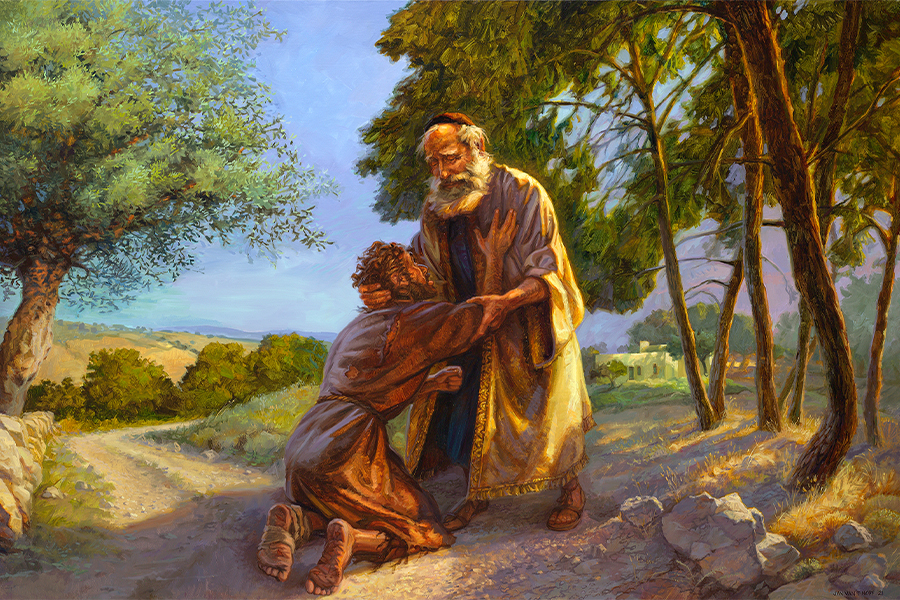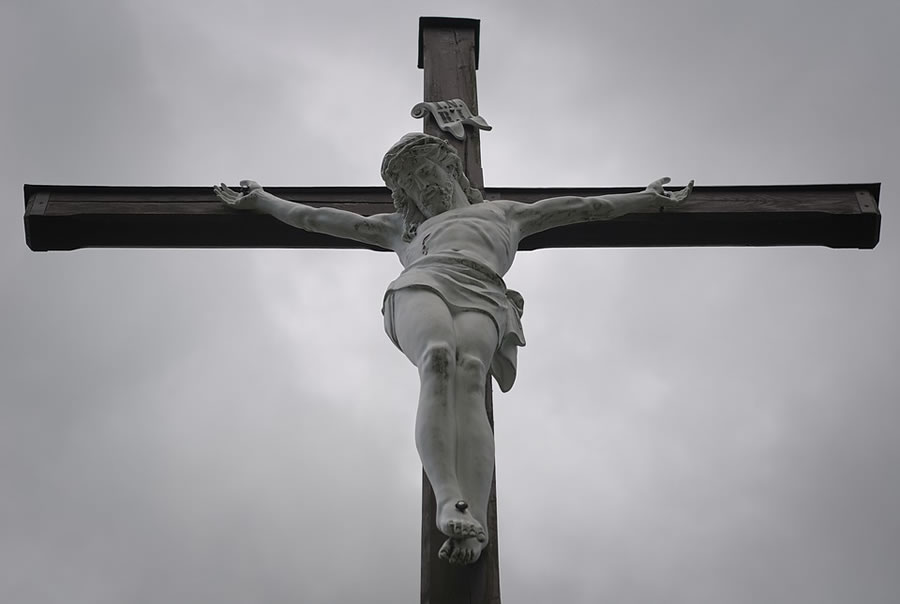St. Francis of Assisi Weekly Reflections

He was Lost, and has been Found
03-27-2022Weekly ReflectionWe Celebrate Worship Resource, Vol. 47, No. 1In Jesus' parables of the prodigal son, neither son really understands his father. The younger son convinces himself to return to his father, but expects to be treated as a servant, not a son. He views his relationship with his father as transactional; he had squandered his entire inheritance, so his father would have nothing material left for him. Meanwhile, the older son cannot understand his father’s generous response to his brother’s shameful return. As a transactional exchange, it’s plainly out of line. Moreover, he saw any money (or love) his father spent on his wayward brother as something unfairly taken away from him. Though the story identifies the younger son as prodigal, his father is even more so, for it is he who is extravagant with his mercy to the point of recklessness, who lavishes his love on his disobedient son before he even walks in the door. No questions. No recriminations. No ground rules. We are blessed to be children of a prodigal Father, our model of mercy, who rejoices with every lost daughter and son who is found.
Can you embody the mercy we know in God? Whom can you respond to with extravagant forgiveness?
Él estaba perdido, y se ha Encontrado
En las parábolas de Jesús sobre el hijo pródigo, ninguno de los hijos comprende realmente a su padre. El hijo menor se convence a sí mismo de volver con su padre, pero espera ser tratado como un sirviente, no como un hijo. Él ve su relación con su padre como transaccional; había dilapidado toda su herencia, por lo que a su padre no le quedaría nada material. Mientras tanto, el hijo mayor no puede entender la generosa respuesta de su padre al vergonzoso regreso de su hermano. Como intercambio transaccional, está claramente fuera de lugar. Además, veía cualquier dinero (o amor) que su padre gastaba en su hermano descarriado como algo que le había sido arrebatado injustamente. Aunque la historia identifica al hijo menor como pródigo, su padre lo es aún más, porque es él quien es extravagante con su misericordia hasta la pinta de imprudencia, quien prodiga su amor en su hijo desobediente incluso antes de que entre por la puerta. Sin preguntas. Sin recriminaciones. Sin reglas básicas. Somos dichosos de ser hijos de un Padre pródigo, nuestro modelo de misericordia, que se regocija con cada hija e hijo perdido que encuentra.
¿Puedes encarnar la misericordia que conocemos en Dios? ¿A quién puedes responder con un perdón extravagante?

Bearing Fruit this Lent
03-20-2022Weekly ReflectionWe Celebrate Worship Resource, Vol. 47, No. 1Knowing the ending can ruin a good story. Lent can lose its meaning if we focus only on the ending. Yes, we know that Jesus dies, is raised, and saves us from our sins. Though we know that we are redeemed, we remain sinful creatures in need of repentance. Lent is our annual reminder of this, an excellent opportunity to repent and seek forgiveness. In today’s Gospel, Jesus tells a parable that illustrates this opportunity God gives us. Year after year, a fig tree bears no fruit. The owner orders the gardener to cut it down. The gardener promises to fertilize it and cultivate it if given just one more year. The fact that Jesus tells this parable after being told of dozens of people’s untimely deaths—news to which he concludes, “If you do not repent, you will all perish as they did!”—reveals the stakes here (Luke 13:5). We have been given that “one more year”. We are called to repent, to grow, to flower, to bear fruit. Now. May we not miss this opportunity. May each of our stories find a joyous ending.
How can you bear fruit this Lent?
Dando Frutos esta Cuaresma
Saber el final puede arruinar una buena historia. La Cuaresma puede perder su significado si nos enfocamos solo en el final. Sí, sabemos que Jesús muere, resucita y nos salva de nuestros pecados. Aunque sabemos que somos redimidos, seguimos siendo criaturas pecadoras que necesitan arrepentimiento. La Cuaresma es nuestro recordatorio anual de esto, una excelente oportunidad para arrepentirse y buscar el perdón. En el evangelio de hoy, Jesús cuenta una parábola que ilustra esta oportunidad que Dios nos da. Año tras año, una higuera no da fruto. El dueño le ordena al jardinero que lo tale. El jardinero promete fertilizarlo y cultivarlo si le dan solo un año más. El hecho de que Jesús cuente esta parábola después de escuchar la muerte prematura de decenas de personas, noticia a la que concluye: “¡Si ustedes no se arrepienten, perecerán de manera semejante!”, revela lo que está en juego aquí (Lucas 13:5). Se nos ha dado ese “un año más”. Estamos llamados a arrepentirnos, a crecer, a florecer, a dar fruto. Ahora. Que no perdamos esta oportunidad. Que cada una de nuestras historias encuentre un final feliz.
¿Cómo puedes dar fruto esta Cuaresma?

Stepping Out of the Darkness
03-13-2022Weekly ReflectionWe Celebrate Worship Resource, Vol. 47, No. 1A week before Jesus was transfigured, he told his disciples a difficult truth. He warned them that he would suffer and die at the hands of the authorities. He told them that they too would suffer: “If anyone wishes to come after me, he must deny himself and take up his cross daily and follow me” (Luke 9:23). This would have been worrying Peter, James, and John when they went up the mountain with Jesus to pray. Abram’s mind may have been troubled in the first reading as well, for after being surrounded by birds of prey feasting upon animal carcasses, a “deep, terrifying darkness enveloped him” (Genesis 15:12). Both miraculous events we hear narrated today emerged from a dark and difficult place. For Abram, a flaming torch lit up the darkness as God entered into a covenant with him. Peter, James, and John were given a vision of the glory that would follow Jesus’ death and resurrection. God spoke to Abram out of the terrifying darkness. Our own lives can be filled with fearful darkness, with traumatic events. During this penitential season, when we seek to transfigure our failing and our shadows, we look to the glorious future when light will truly overcome the darkness.
What darknesses in your life do you long to see transfigured?
Saliendo de la Oscuridad
Una semana antes de que Jesús fuera transfigurado, les dijo a sus discípulos una verdad difícil. Les advirtió que sufriría y moriría a manos de las autoridades. Les dijo que ellos también sufrirían: “Si alguno quiere seguirme, niéguese a sí mismo, tome su cruz cada día y sígame” (Lucas 9:23). Esto habría estado preocupando a Pedro, Santiago y Juan cuando subieron a la montaña con Jesús para orar. Es posible que la mente de Abram también haya estado perturbada en la primera lectura, porque después de estar rodeado de aves rapaces que se alimentaban de cadáveres de animales, una “un terror intenso y misterioso se apoderó de él.” (Génesis 15:12). Ambos eventos milagrosos que escuchamos narrados hoy surgieron de un lugar oscuro y difícil. Para Abram, una antorcha encendida iluminó la oscuridad cuando Dios hizo un pacto con él. A Pedro, Santiago y Juan se les dio una visión de la gloria que seguiría a la muerte y resurrección de Jesús. Dios le habló a Abram desde la oscuridad aterradora. Nuestras propias vidas pueden estar llenas de oscuridad aterradora, con eventos traumáticos. Durante este tiempo de penitencia, cuando buscamos transfigurar nuestras fallas y nuestras sombras, miramos hacia el futuro glorioso en el que la luz vencerá verdaderamente a las tinieblas.
¿Qué tinieblas de tu vida anhelas ver transfiguradas?

Confronting Temptation
03-06-2022Weekly ReflectionWe Celebrate Worship Resource, Vol. 47, No. 1We can more fully appeciate today’s Gospel, which details how the devil tempted Jesus in the desert, by realizing what occurs before and after. Just before going to the desert, the Holy Spirit descended upon Jesus in baptism. Immediately after leaving the desert, he returned to Galilee and began calling disciples, preaching, and healing the sick. He began his mission. In between, aided by the Holy Spirit and preparing for his mission, he fasted, prayed and resisted temptation over his forty days in the desert. We have now begun the forty-day season that precedes the holiest week of the year. With the help of the Holy Spirit, whom we also received in baptism, we confront the temptations to put our own desires before the needs of others and our relationship with God. How do we resist temptations and ready ourselves for our mission? Recall the Gospel passage from Ash Wednesday, in which Jesus taught his disciples how to fast, pray, and give alms. Keeping these disciplines focuses our thoughts and our actions on God and on others and away from ourselves. In this way, the Word-made-flesh may be in our mouth and in our heart during this holy season.
What do you find yourself tempted by? How can you confront this temptation?
Enfrentando la Tentación
Podemos apreciar más plenamente el Evangelio de hoy, que detalla cómo el diablo tentó a Jesús en el desierto, al darnos cuenta de lo que ocurre antes y después. Justo antes de ir al desierto, el Espíritu Santo descendió sobre Jesús en el bautismo. Inmediatamente después de dejar el desierto, regresó a Galilea y comenzó a llamar discípulos, predicar y sanar a los enfermos. Empezó su misión. En el medio, ayudado por el Espíritu Santo y preparándose para su misión, ayunó, oró y resistió la tentación durante sus cuarenta días en el desierto. Ahora hemos comenzado la temporada de cuarenta días que precede a la semana más santa del año. Con la ayuda del Espíritu Santo, que también recibimos en el bautismo, enfrentamos las tentaciones de anteponer nuestros propios deseos a las necesidades de los demás ya nuestra relación con Dios. ¿Cómo resistimos las tentaciones y nos preparamos para nuestra misión? Recordemos el pasaje evangélico del Miércoles de Ceniza, en el que Jesús enseñó a sus discípulos a ayunar, orar y dar limosna. Mantener estas disciplinas enfoca nuestros pensamientos y nuestras acciones en Dios y en los demás y lejos de nosotros mismos. De esta manera, el Verbo- hecho-carne puede estar en nuestra boca y en nuestro corazón durante este tiempo santo.
¿Qué te tienta? ¿Cómo puedes enfrentar esta tentación?

Words Matter
02-27-2022Weekly ReflectionWe Celebrate Worship Resource, Vol. 47, No. 1What we say matters. We know this because what we hear matters. What we hear—from family and friends, from teachers and colleagues, from those in public office and those in the media—informs us and persuades us. By the same token, what we say shapes the opinions of those who hear us. Sirach warns us that our faults appear when we open our mouths, for what we say is a test of the kind of person we are. Jesus teaches his disciples that “from the fullness of the heart the mouth speaks”: a good heart produces good but an evil heart produces evil (Luke 6:45). Both Sirach and Jesus use the analogy of a tree and the fruit that it bears. Recall that Jesus said he was the true vine and those who remain on the vine and remain in him will bear fruit. Animated by the vine that is Christ, who is the Word made flesh, we choose the words we use to reflect the goodness in our heart. We speak out against injustice and dishonesty. We speak up for those whose voice is ignored. We speak considerately, knowing that our words reveal our hearts even as they change others’ hearts and minds. Words matter. The Word matters.
What have you said that you wish you hadn’t said that way or said at all? Conscious of the fullness of Christ in your heart, what can you say now?
Las Palavras Importan
Lo que decimos es importante. Lo sabemos porque lo que escuchamos es importante. Lo que escuchamos, de familiares y amigos, de maestros y colegas, de aquellos en la oficina pública y aquellos en los medios de comunicación, nos informan y nos persuaden. De la misma manera, lo que decimos da forma a las opiniones de quienes nos escuchan. Sirácide nos advierte que nuestras fallas aparecen cuando abrimos nuestra boca, por lo que decimos es una prueba del tipo de persona que somos. Jesús enseña a sus discípulos que “boca habla de lo que esta lleno el corazón”: un corazón bueno produce el bien, pero un corazón maligno produce el mal (Lucas 6:45). Tanto Sirácide como Jesús usan la analogía de un árbol y la fruta que lleva. Recuerde que Jesús dijo que era la verdadera vid y aquellos que permanecen en la vid y permanecer en él darán frutos. Animado por la vid que es Cristo, ¿quién es la palabra hecha carne, elegimos las palabras que usamos para reflejar la bondad en nuestro corazón? Hablamos contra la injusticia y la deshonestidad. Hablamos para aquellos cuya voz se ignora. Hablamos considerablemente, sabiendo que nuestras palabras revelan nuestros corazones, incluso hasta cuando cambian los corazones y las mentes de los demás. Las palabras importan. La Palabra importa.
¿Qué has dicho que desearías no haber dicho de esa manera o dicho en absoluto? Consciente de la plenitud de Cristo en tu corazón, ¿qué puedes decir ahora?

Kindness & Mercy
02-20-2022Weekly ReflectionWe Celebrate Worship Resource, Vol. 47, No. 1"It's not fair!" If you're a parent of young children, you probably hear this every day. You’ve certainly said it yourself, or at least felt that way, in some context. But this plea assumes that life is transactional. Whatever you get, I should get, too. If I do something good, I should get something good in return. Jesus teaches a different way of looking at life. Having just taught his Beatitudes, he extends this perspective to the way we treat each other. Reach out in love, kindness, generosity, and goodness to everyone, friend and enemy alike. Why? We should be kind and merciful because God, our Father, is kind and merciful. Kindness and mercy are not limited resources that we should only “spend” on those who are worthy. God is kind and merciful to all, even “the ungrateful and the wicked” (Luke 6:35). Just as the Lord looked kindly on David when he spared Saul’s life. The Father will look kindly on us when we give and forgive instead of judging and condemning. It is a bold challenge and a difficult one, but the One whose generosity is overflowing has given us both a promise and a model.
To whom do you need to respond anew with kindness and mercy?
Bondad y Misericordia
"¡No es justo!" Si eres padre de niños pequeños, probablemente escuchas esto todos los días. Ciertamente lo has dicho tu mismo, o al menos te has sentido así, en algún contexto. Pero esta petición asume que la vida es transaccional. Lo que sea que obtengas, yo también debería obtener. Si hago algo bueno, debería obtener algo bueno a cambio. Jesús nos enseña una forma diferente de mirar la vida. Habiendo impartido sus beatitudes, extiende esta perspectiva de la forma en que nos tratamos. Extiende amor, amabilidad, generosidad y bondad para todos, amigo y enemigo por igual. ¿Por qué? Deberíamos ser amables y misericordiosos porque Dios, nuestro Padre, es amable y misericordioso. La amabilidad y la misericordia no son recursos limitados que solo deberíamos “gastar” en aquellos que son dignos. Dios es amable y misericordioso con todos, “ hasta con los malos y los ingratos” (Lucas 6:35). Así como el Señor miraba amablemente a David cuando le salvó la vida a Saúl. El padre nos verá amablemente cuando damos y perdonemos en lugar de juzgar y condenar. Es un desafío audaz y difícil, pero a aquel que la generosidad está desbordada, nos ha dado una promesa y un modelo.
¿A quién necesitas responderle con bondad y misericordia?

Godsend
02-13-2022Weekly ReflectionWe Celebrate Worship Resource, Vol. 47, No. 1How would you feel if you received an invitation today to a simple but free meal, maybe a plate with beans, some bread, and a tall glass of cool water? If you are wealthy, you would likely refuse, for you know you could afford a much more sumptuous meal elsewhere. But if you are having difficulty putting food on your table and your family is starving, this complimentary meal would be a godsend. Exactly: a godsend. Something sent by the grace of God. In Luke’s account of the Beatitudes, Jesus shows the crowds both sides of the coin. The hungry will be satisfied, but the satisfied will be hungry. The despairing will be joyful, but the joyful will despair. Jesus is able to preach this for he is literally a godsend, sent by God to save us. In him, we are redeemed. Because of him, we can train our eyes on heaven. As Paul wrote, our hope in Christ is not for this life only. Or to use Jeremiah’s imagery from the first reading, we are like trees planted by a stream, stretching out our roots to the living waters Christ brings, for he satisfies us with joy, with plenty, and ultimately, with the kingdom of God.
How can you be a godsend for others?
Don del Cielo
Cómo se sentría si hoy recibiiera una initación a una comida sencilla pero gratuita, tal vez un plato con frijoles, un poco de pan y un vaso de agua fría? Si es rico, probablemente se negaría, porque sabe que podría permitirse una comida mucho más suntuosa en otro lugar. Pero si tiene dificultades para poner comida en su mesa y su familia se muere de hambre, esta comida de cortesía sería un don del cielo. Exactamente: un don del cielo. Algo enviado por la gracia de Dios. En el relato de las Bienaventuranzas de Lucas, Jesús muestra a la multitud las dos caras de la moneda. El hambriento será saciado, pero el saciado tendrá hambre. La desesperación será gozosa, pero los gozosos desesperarán. Jesús puede predicar esto porque es literalmente un don del cielo, enviado por Dios para salvarnos. En él somos redimidos. Gracias a él, podemos dirigir nuestra mirada al cielo. Como escribió Pablo, nuestra esperanza en Cristo no es solo para esta vida. O para usar las imágenes de Jeremías de la primera lectura, somos como árboles plantados junto a un arroyo, extendiendo nuestras raíces hacia las aguas vivas que trae Cristo, porque nos satisface con alegría, con abundancia y, en última instancia, con el reino de Dios.
¿Cómo puedes ser una bendición para los demás?

Here I am , Lord, Send Me!
02-06-2022Weekly ReflectionWe Celebrate Worship Resource, Vol. 47, No. 1As Peter hovered in the background in the wake of Jesus’ arrest, scared of being taken away as well, did he think back to his astonishment three years before when he first met Jesus in the scene we hear narrated today? He landed probably the biggest catch of fish he’d ever had, yet he abandoned his trade and all his belongings to follow Jesus. Also during Holy Week we hear Isaiah testify, “I gave my back to those who beat me...my face I did not shield from buffets and spitting” (Isaiah 50:6). Did he recall the enthusiasm we hear him express today when he is called by God: “Here I am...send me! (Isaiah 6:8)? In the second reading, Paul reminds us of his own call, as well as his remorse for persecuting the church. In each case, the power of the Lord’s call not only leads them to follow at once, but it also drives them to persevere through fear and hurt. Isaiah remains steadfast in his faith, setting his face “like flint” (50:7). Paul continues to preach through danger and imprisonment. Peter, after tears of shame and sorrow, becomes the rock upon which the church is built. Following God’s call is not easy, but its power enables us to withstand suffering and overcome failure.
What hardships has your faith help you overcome?
Aquí estoy, Señor, ¡Envíame!
Mientras Pedro andaba en el fondo tras el arresto de Jesús, temeroso de que también se lo llevaran, ¿recordó su asombro tres años antes cuando conoció a Jesús por primera vez en la escena que escuchamos narrada hoy? Atrapó probablemente la pesca más grande que jamás había tenido, sin embargo, abandonó su oficio y todas sus pertenencias para seguir a Jesús. También durante la Semana Santa escuchamos a Isaías testificar: “Di mi cuerpo a los heridores...no escondí mi rostro de injurias y de esputos.” (Isaías 50:6). ¿Recordaba el entusiasmo que le oímos expresar hoy cuando es llamado por Dios: “Aquí estoy... ¡envíame! (Isaías 6:8)? En la segunda lectura, Pablo nos recuerda su propio llamado, así como su remordimiento por perseguir a la iglesia. En cada caso, el poder del llamado del Señor no solo los lleva a seguir de inmediato, sino que también los impulsa a perseverar a través del miedo y el dolor. Isaías permanece firme en su fe, poniendo su rostro “como pedernal” (50:7). Pablo continúa predicando a través del peligro y el encarcelamiento. Pedro, después de lágrimas de vergüenza y dolor, se convierte en la roca sobre la que se edifica la iglesia. Seguir el llamado de Dios no es fácil, pero su poder nos permite resistir el sufrimiento y superar el fracaso.
¿Qué dificultades te ha ayudado a superar tu fe?

Love... The Greatest Gift of All
01-30-2022Weekly ReflectionWe Celebrate Worship Resource, Vol. 47, No. 1Saint Paul did not write letters to far-flung Christian communities just to keep in touch. No, he sent letters because debates, disagreements, and outrightdivisions had broken out among its members. Disagreements were to be expected, but divisions were dangerous and distressing. Paul wanted to make sure that Corinth avoided division. Jesus had been confronted with similar discord in his hometown when he explained that like the prophets of old, he was not sent to help the faithful of his native place. Indeed, Jesus would go on to spend his time with sinners and foreigners. Matthew and Mark mention that the people of Nazareth were unbelieving. But Luke—the only evangelist to tell the parable of the good Samaritan and the account of the ten lepers (when only the Samaritan returned to give thanks) - writes that the townsfolk turn furious and homicidal. With reactions like this in mind, Paul wants to emphasize to the church in Corinth that love is the greatest of all spiritual gifts. We are blessed with it, capable of it. With love, disagreements are resolved without discord, for love seeks the truth, not its own interests. Love bears differences, for it endures beyond disagreements.
What disagreement has affected you recently? How can love help to resolve it?
Amor... El Mayor de Todos los Dones
San Pablo no escribió cartas a comunidades cristianas remotas sólo para mantenerse en contacto. No, enviaba cartas porque entre sus miembros se habían desatado debates, desavenencias y francas divisiones. Los desacuerdos eran de esperar, pero las divisiones eran peligrosas y angustiosas. Pablo quería asegurarse de que Corinto evitara la división. Jesús se enfrentó a una discordia similar en su ciudad natal cuando explicó que, como los profetas de antaño, no fue enviado para ayudar a los fieles de su lugar de origen. De hecho, Jesús pasaría su tiempo con pecadores y extranjeros. Mateo y Marcos mencionan que la gente de Nazaret era incrédula. Pero Lucas, el único evangelista que cuenta la parábola del buen samaritano y el relato de los diez leprosos (cuando sólo el samaritano volvió a dar gracias), escribe que la gente del pueblo se vuelve furiosa y homicida. Con reacciones como esta en mente, Pablo quiere enfatizar a la iglesia de Corinto que el amor es el mayor de todos los dones espirituales. Somos bendecidos con ello, somos capaces de ello. Con amor se resuelven los desacuerdos sin discordia, porque el amor busca la verdad, no sus propios intereses. El amor soporta las diferencias, porque perdura más allá de los desacuerdos.
¿Qué desacuerdo te ha afectado recientemente? ¿Cómo puede el amor ayudar a resolverlo?

Today this Scripture passage is Fulfilled
01-23-2022Weekly ReflectionWe Celebrate Worship Resource, Vol. 47, No. 1Today this scripture passage is fulfilled in your hearing” (Luke 4:21). Jesus stuns the faithful of his hometown when he follows the passage from Isaiah with these words. They cannot imagine that their native son is the Messiah whom Isaiah prophesized. What began as just an ordinary sabbath in the synagogue became anything but. The worship service we hear about in Nehemiah is a special one to begin with. Ezra gathered the faithful out in the open, which was noteworthy, for they had just returned to Jerusalem after years of exile. After he read from the Torah, the people wept. Perhaps worshiping in the holy city once again overwhelmed them, perhaps it was remorse for presumed sin, or perhaps God’s laws felt like too much. Whatever the case, Nehemiah assures them of how special this day is: “Today is holy to our Lord” (Nehemiah 8:10). We know that Jesus is present with us whenever we gather in his name. So the “today” we hear is not just in the fifth century BC or the first century AD. It is here and now. For today, this very day, the Anointed One is here, bringing glad tidings to the poor and proclaiming liberty, healing, and jubilee year to us all.
How can you—who have put on Christ in baptism—make today special in the Lord?
Hoy mismo se ha Cumplido este pasaje
Hoy mismo me ha cumplido este pasaje de la Escritura que acaban de oír” (Lucas 4:21). Jesús aturde a los fieles de su ciudad natal cuando sigue el pasaje de Isaías con estas palabras. No pueden imaginar que su hijo nativo es el Mesías a quien Isaías profetizó. Lo que comenzó como un sábado ordinario en la sinagoga se convirtió en algo menos. El servicio de adoración que escuchamos en Nehemías es uno especial para empezar. Ezra reunió a los fieles al aire libre, que fue notable, porque acababan de regresar a Jerusalén después de años de exilio. Después de leer de la Torá, la gente lloró. Tal vez adorar en la Ciudad Santa una vez más los abrumó, tal vez fue remordimiento por el presunto pecado, o quizás las leyes de Dios se sentían como demasiado. Cualquiera que sea el caso, Nehemías les asegura cómo es especial este día: “Hoy es un día consagrado al Señor” (Nehemías 8:10). Sabemos que Jesús está presente con nosotros cuando nos reunimos en su nombre. Entonces, el “Hoy” que escuchamos no es solo en el siglo BC o en el primer siglo. Está aquí y ahora. Por hoy, este mismo día, el ungido está aquí, brotando nuevas noticias a los pobres y proclamando la libertad, la sanación y el año de celebración a todos.
¿Cómo puedes tu — quién te has vestido de Cristo en el bautismo— hacer que hoy sea especial para el Señor?

Converting into Something New
01-15-2022Weekly ReflectionWe Celebrate Worship Resource, Vol. 47, No. 1Ostensibly, the Gospel passage we hear today was placed at the beginning of Ordinary Time because it comes at the beginning of John’s Gospel. However, its placement a week after the feast of Baptism of the Lord is also appropriate, for this passage is all about conversion. The miracle Jesus accomplished at the wedding at Cana converted water into wine, but also converted the hearts and minds of his disciples, who were still coming to an understanding of this man they called Rabbi (Teacher) and Messiah. Isaiah’s poetry celebrates the conversion of the holy city and its people from defeated and desolate to victorious and vindicated, even using the language of a wedding ceremony to describe the joy and promise of God’s care. This wedding reception at Cana is Jesus’ first recorded meal with his disciples. At their last meal, he used water from similar jars to wash his disciples’ feet as a model of service, then changed wine into his Blood. In Jesus, the ordinary is converted into something new, something greater, something glorious. May our own continual conversion, expressed in the spiritual gifts we have received, be as well.
How has your world been converted through the workings of our Lord?
Convertiendonos en Algo Nuevo
Aparentemente, el pasaje del Evangelio que escuchamos hoy se colocó al comienzo del Tiempo Ordinario porque viene al comienzo del Evangelio de Juan. Sin embargo, también es apropiado colocarlo una semana después de la fiesta del Bautismo del Señor, ya que este pasaje tiene que ver con la conversión. El milagro que realizó Jesús en las bodas de Caná convirtió el agua en vino, pero también convirtió el corazón y la mente de sus discípulos, que aún estaban llegando a comprender a este hombre al que llamaban Rabí (Maestro) y Mesías. La poesía de Isaías celebra la conversión de la ciudad santa y su gente de derrotados y desolados a victoriosos y vindicados, incluso usando el lenguaje de una ceremonia nupcial para describir el gozo y la promesa del cuidado de Dios. Esta recepción de bodas en Caná es la primera comida registrada de Jesús con sus discípulos. En su última comida, usó agua de tinajas similares para lavar los pies de sus discípulos como modelo de servicio, luego transformó el vino en su Sangre. En Jesús, lo ordinario se convierte en algo nuevo, algo más grande, algo glorioso. Que nuestra propia conversión continua, expresada en los dones espirituales que hemos recibido, lo sea también.
¿Cómo se ha convertido tu mundo a través de las obras de nuestro Señor?

With You I am Well Pleased
01-09-2022Weekly ReflectionWe Celebrate Worship Resource, Vol. 47, No. 1While the Chosen People suffered in exile, a voice called out to a young prophet. The voice spoke with words of power and promise, words of comfort and tenderness, words of hope and blessing. This voice was God’s. That voice is heard once again many centuries later after Jesus is baptized. The Lord’s message to Jesu is much simpler and straightforward: “You are my beloved Son; with you I am well pleased” (Luke 3:22). No “bring forth justice,” “open the eyes of the blind,” or “the glory of the Lord shall be revealed” is necessary, for all this is already present in the person of Jesus (Isaiah 42:1, 7, 40:5). From this point on, filled with the Holy Spirit, Jesus brings forth justice, open the eyes of the blind, and reveals the Father's glory. Baptized in Christ, we too are changed to listen for the Lord’s voice. Empowered by the Holy Spirit, who descended upon us at our baptism, we are called to prepare the way, just as Isaiah and John and Peter and Paul and Titus were, so that justice and peace and kindness and love may spread to every nation, to every people. We too are God’s beloved children. May the Lord be well pleased with us.
How is God calling you to live out your baptismal commitment?
En Ti me Complazco
Mientras el Pueblo Elegido sufría en el exilio, una voz llamó a un joven profeta. La voz habló con palabras de poder y promesa, palabras de consuelo y ternura, palabras de esperanza y bendición. Esta voz era de Dios. Esa voz se escucha una vez más muchos siglos después del bautismo de Jesús. El mensaje del Señor a Jesús es mucho más simple y directo: “Tú eres mi Hijo amado; en ti me complazco” (Lucas 3:22). No es necesario “brillar la justicia”, “abrir los ojos de los ciegos”, o “muchas veces la gloria del Señor será revelada”, porque todo esto ya está presente en la persona de Jesús (Isaías 42:1, 7, 40:5). A partir de este momento, lleno del Espíritu Santo, Jesús trae justicia, abre los ojos de los ciegos y revela la gloria del Padre. Bautizados en Cristo, también nosotros somos transformados para escuchar la voz del Señor. Fortalecidos por el Espíritu Santo, que descendió sobre nosotros en nuestro bautismo, estamos llamados a preparar el camino, como lo fueron Isaías, Juan, Pedro, Pablo y Tito, para que la justicia, la paz, la bondad y el amor se extiendan a todas las naciones, a cada pueblo. Nosotros también somos los hijos amados de Dios. Que el Señor esté complacido con nosotros.
¿Cómo te está llamando Dios a vivir tu compromiso bautismal?

The Light of the World
01-02-2022Weekly ReflectionWe Celebrate Worship Resource, Vol. 47, No. 1Just over a week ago we celebrated Jesus’ birth. We heard Isaiah prophesy that the Lord would come as a light in the darkness and John confirm that the darkness would not overcome it. Today we celebrate the effect of this light, the extent of this light, and the power of this light. Isaiah, returning to the ruins of Jerusalem, envisions a city restored to glory, so radiant that its light will draw Arabians from north (the nomads of Midian) to south (the traders of Sheba), outsiders both. The psalmist sings of all the nations on earth being attracted to God’s glory, demonstrated not by triumph in war, but by the triumph of peace: a “profound peace” (72:7) marked by care for the poor, the afflicted, and the lowly. Paul, enlightened by the revelation of the Holy Spirit, testifies that the Gentiles are members—not of a supplemental body, or even a complementary body—but of the same body, fully part of the one body of Christ. Finally, in the Gospel we hear of the light from the star, that light that leads the magi from the east with their gifts and devotion. Jesus, the Light of the World, shines forth to all, for all, over all, one body of Christ.
How have you seen Christ’s light in your life?
La Luz del Mundo
Hace poco más de una semana celebramos el nacimiento de Jesús. Escuchamos a Isaías profetizar que el Señor vendría como una luz en las tinieblas y Juan confirmó que las tinieblas no lo vencerían. Hoy celebramos el efecto de esta luz, la extensión de esta luz y el poder de esta luz. Isaías, al regresar a las ruinas de Jerusalén, imagina una ciudad restaurada a la gloria, tan radiante que su luz atraerá a los árabes del norte (los nómadas de Madián) al sur (los comerciantes de Sabá), ambos forasteros. El salmista canta que todas las naciones de la tierra se sienten atraídas por la gloria de Dios, demostrada no por el triunfo en la guerra, sino por el triunfo de “la paz” (71:7) marcada por el cuidado de los pobres, los afligidos y los humildes. Pablo, iluminado por la revelación del Espíritu Santo, testifica que los gentiles son miembros, no de un cuerpo suplementario, ni siquiera de un cuerpo complementario, sino del mismo cuerpo, plenamente parte del único cuerpo de Cristo. Finalmente, en el Evangelio escuchamos de la luz de la estrella, esa luz que guía a los magos de oriente con sus dones y devoción. Jesús, la Luz del Mundo, brilla para todos, por todos, sobre todos, un solo cuerpo de Cristo.
¿Cómo has visto la luz de Cristo en tu vida?